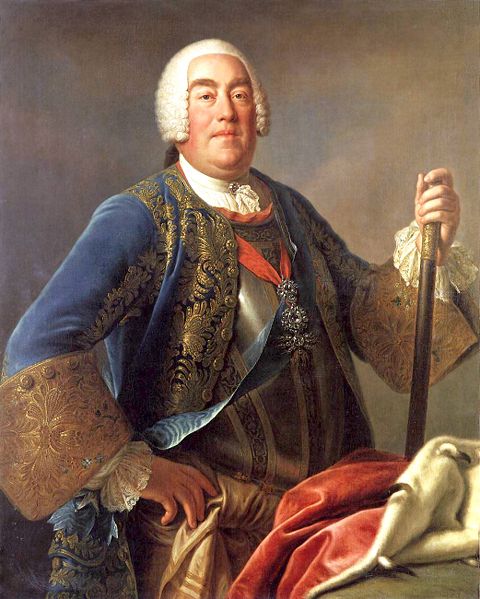<Back to Index>
- Nutritionist Robert Coleman Atkins, 1930
- Playwright Arthur Asher Miller, 1915
- King of Poland Augustus III, 1696
PAGE SPONSOR

Augustus III, known as the Saxon; also Prince-elector Friedrich August II (Dresden, 17 October 1696 – 5 October 1763 in Dresden) was the Elector of Saxony in 1733-1763, as Frederick Augustus II, King of Poland and Grand Duke of Lithuania in 1734-1763.
Augustus was the only legitimate son of Augustus II the Strong, Imperial Prince-Elector of Saxony and monarch of the Polish–Lithuanian Commonwealth, by his wife, Christiane Eberhardine of Brandenburg-Bayreuth. He was groomed to succeed his father as King of Poland and Grand Duke of Lithuania, and thus in 1721, converted to Catholicism.
After his father's death, he inherited Saxony and was elected King of Poland, with the support of Russian and Austrian military forces in the War of the Polish Succession (1733-1738). As King, Augustus III was uninterested in the affairs of his Polish-Lithuanian dominion, focusing on interests like hunting, opera and collecting paintings (Gemäldegalerie Alte Meister). During his 30-year reign, he spent less than a total of three years in Poland, where the struggle between the House of Czartoryski and the Potocki paralysed the Sejm (Liberum Veto), fostering internal political anarchy and further weakening the Polish–Lithuanian Commonwealth. Augustus III delegated most of his powers and responsibilities to Heinrich von Brühl, who became quasi-dictator of Poland.
The thirty years of Augustus III's reign saw the Seven Years' War (1754 and 1756–1763), and neighboring Prussia, Austria and Russia refining their plans to partition Poland, among them.
His eldest surviving son, Frederick Christian, eventually succeeded his father as Elector of Saxony, but not as King of Poland. It was Stanisław August Poniatowski, who was elected King of the Polish–Lithuanian Commonwealth, after a coup d'état by the House of Czartoryski, supported by Russian troops on 7 September 1764.
In Dresden on 20 August 1719, Augustus married the Archduchess, Maria Josepha of Austria, daughter of Joseph I, the Holy Roman Emperor. They had fifteen children.